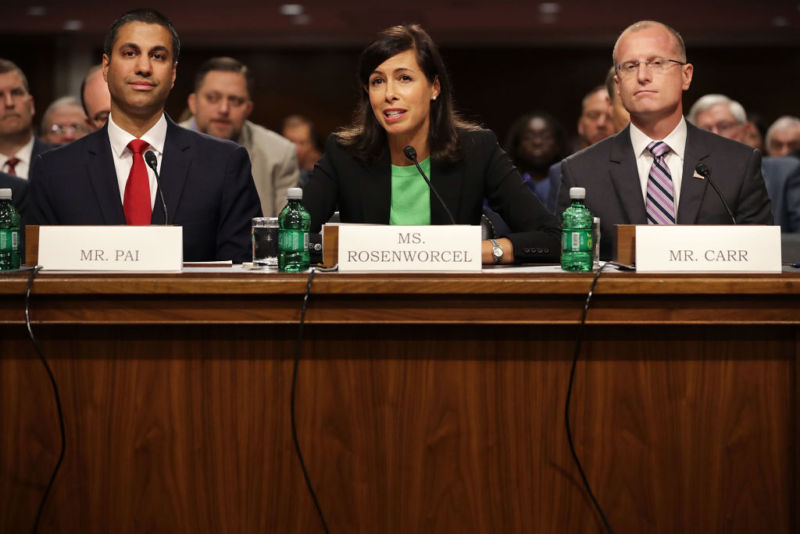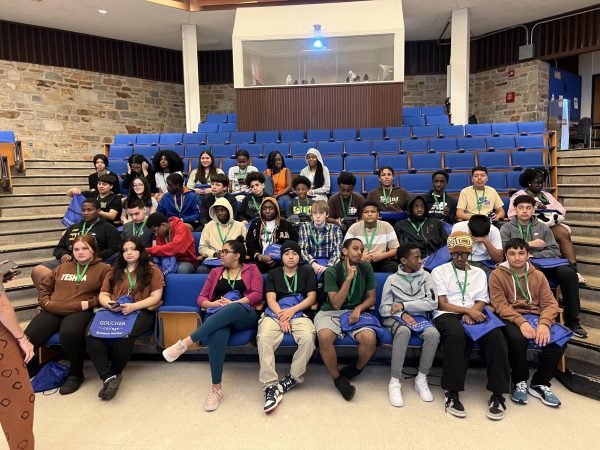FCC set to repeal net neutrality rules
photo by Getty Images
WASHINGTON, DC – JULY 19: (L-R) Federal Communications Commission Chairman Ajit Pai and nominees Jessica Rosenworcel and Brendan Carr prepare to testify before the Senate Commerce, Science and Transportation Committee during their confirmation hearing in the Dirksen Senate Office Building on Capitol Hill July 19, 2017 in Washington, DC. Pai has served as the FCC chairman since January of 2017 and is due for re-appointment. (Photo by Chip Somodevilla/Getty Images)
The Federal Communications Commission is set to vote next month on a new plan that will essentially wipe out the concept of net neutrality. The proposal, announced by FCC chairman Ajit Pai, will pose as a significant victory for broadband and telecom companies like AT&T and Verizon, and is causing much worry for smaller businesses and private citizens.
Despite the overwhelming amount of controversy over the issue, many are confused and unclear regarding what exactly net neutrality actually is, and why it’s so important. A concept that was introduced during the Obama administration, net neutrality is a set of rules designed to prevent broadband and telecom companies from determining how consumers use the internet. These rules ensure that such companies won’t be able to block access to certain online content, slow internet speed, or charge consumers for access to different services on the web.
The FCC’s new plan, however, is to return to the free market approach of the 1990’s, which generated trillions of dollars in investment, and gave room for companies like Google and Facebook to grow into the powerhouses they are today.
In an interview on PBS NewsHour, chairman Ajit Pai explained the reasoning behind the agency’s upcoming decision:
“From the dawn of the commercial Internet in the 1990s until 2015, we had light-touch regulation, where the agency or where the country monitored the market, let it develop organically,” Pai said, shedding light on the former approach that was successful in the past.
According to Pai, this is the vision that the FCC has for the future of the internet, “And it’s under that light-touch framework that the companies were able to become globally known names… that’s the kind of success that we want to promote in the future with light-touch regulation.”
Unfortunately, this plan doesn’t work out so well for everyone. If these broadband internet providers are allowed to charge higher fees for access to certain sites, a multitude of online companies will find themselves struggling to stay afloat. While larger corporations like Ebay or Hulu can easily afford to pay for faster delivery of their online content, smaller startups will end up squashed by the new proposal.
These proposed deregulations will heavily favor large telecommunication companies, as they lift almost all restrictions from the ISPs. Granting internet providers the jurisdiction to charge higher fees for certain online services will allow them to have an almost-monopoly over the internet. To provide a hypothetical example, a company like Verizon could choose to throttle their internet speed when customers try to access an online streaming service such as Netflix, in order to stifle competition and edge their customers towards their own cable TV service. Throttling, a practice that was banned by the Obama administration’s FCC, is the act of slowing down or degrading lawful internet traffic on the sole basis of content. With the FCC’s upcoming proposal, we can expect to see this become extremely common.
Individual consumers will also be hurt without the protection of net neutrality rules. Private citizens will be forced to pay higher fees for services that they once had access to for free. And as for those who can’t afford to pay such fees, well, they will barely have access to the internet at all.
As the FCC’s voting day on the issue is fast approaching, many are curious as to what the results will look like. The board of the FCC consists of 3 republicans and 2 democrats, including Pai, who was designated as chairman by President Trump this May. The vote will most likely result with a passing of the deregulation proposal, with a predicted vote of 3-2.
Chairman Ajit Pai wasn’t always a public servant. After leaving his post at the Department of justice in 2001, Pai worked as the Assistant General Counsel for Verizon Communications until 2003. This sparks a bit of suspicion considering the fact that the deregulation proposal would directly benefit companies just like his former employers. Some have suggested that these connections may qualify as a conflict of interest.
Despite the fact that the repealing of net neutrality is an almost inevitable outcome, there has been significant public outrage against the efforts to deregulate. Over 217,000 Americans have signed a White House Petition calling for Trump’s administration to take action and try to keep net neutrality in effect. This does signal some hope, but the White House Petition website says that it takes at least 60 days for petitions to receive an official response or explanation, and the FCC’s vote will be well in the past by then. To make matters worse, the White House hasn’t exactly been punctual when it comes to responding to these petitions. A few popular petitions on the website that have been somewhat ignored include, “Repeal the NFA”, “Immediately release Donald Trump’s full tax returns, with all information needed to verify emoluments clause compliance”, and more.
At this point, it doesn’t seem like there is much that anyone can do to try and stop the FCC from getting rid of net neutrality. However, Jessica Rosenworcel (D), a member of the FCC board, wrote an Op-Ed for the LA Times. In her piece she offered a sort of call-to-arms for those who are against deregulation:
“In the time before the agency votes, anyone who agrees should do something old-fashioned: Make a ruckus. Reach out to the rest of the FCC now. Tell them they can’t take away internet openness without a fight.”











